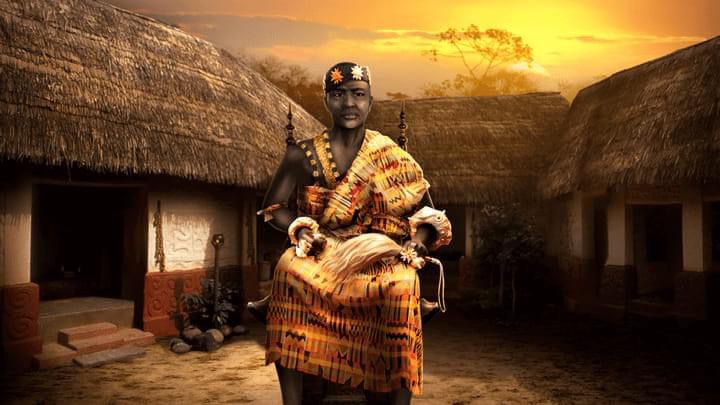United Asante States Under Osei Tutu 1697-1718 (Part 1)

Nana Osei Tutu succeeded Nana Obiri Yeboa as the chief of Kwaman state later known as Kumase state. During his enstoolment, he promised his people that he would take up the great task of uniting the Asante states. He was helped to achieve this aim by the great priest and chief of Agona, Nana Okomfo Anokye.
Nana Osei Tutu and Okomfo Anokye were enstooled at the same time, Osei Tutu as Kwamanhene, and Okomfo Anokye as Agonahene in their respective towns.
Osei Tutu succeeded his uncle Obiri Yeboa and Okomfo Anokye succeeded his brother Okomfo Yamoa.
According to oral tradition, a meeting of the chiefs of Asante states was called by Nana Osei Tutu of Kumase. The main agenda was to unite under one of the chiefs. His stool would be greater than all the other stools, and any chief enstooled by any of the states was to swear the oath of allegiance to him. The old question of “Who would be chosen”? again appeared.
It was at this juncture that Okomfo Anokye explained that the problem would be solved by the ancestors and the gods. He would pray to the ancestors and the gods. At the end of the prayers, the ancestors and the gods would send a stool from the skies and the chief on whose lap it would descend and rest, would be the chosen chief. According to oral tradition, a festive Friday “Fofie” was chosen to be the day they would meet for the gods and ancestors to choose their king for them.
When they agreed on the day, they were told by Okomfo Anokye to fast and pour libation to their ancestors and the gods until the chosen day. Then they dispersed to their various states.
On the appointed day, the chiefs met, each waiting to be the paramount chief elect. The atmosphere looked calm. Okomfo Anokye appeared amidst drumming and dancing. After some magical dances, he paused a little, jumped here and there and began to call something from the sky. The drumming started again and the priest conjured. The sky became tense and a deafening noise was heard. Then a stool studded with gold descended onto the laps of Nana Osei Tutu. It therefore meant that he had been chosen by the ancestors and the gods as the unquestionable king of the kings of the Asante Nation.
Fingernails and a small collection of hair from each chief were collected, all burnt and the ashes, some smeared on the stool and the rest mixed in palm wine for all to drink.
Okomfo Anokye told them that the stool contained the spirit of the Asante Nation. (See Notes 4). The potion they drank meant that they had sworn to the gods, which meant they had taken an oath to unite and forget their past individual histories. Osei Tutu took the oath of allegiance to the stool and the chiefs, and each chief in turn took an oath of allegiance to Nana Osei Tutu and an oath never to raise arms against the Golden Stool. That was the beginning of the Asante kingdom.
Nana Osei Tutu was therefore made the first king of the Asante Kingdom.
His first task was to avenge the defeat the states had suffered from the Dormaa people. This was done without delay and in a fearful battle the Dormaa people were defeated and driven from Suntreso where they were, to a faraway place. This was in about 1698. Though the state was defeated and annexed into the Asante Kingdom their king was made “The Soul Washer” of Asantehene.
Giving a post to a defeated chief was a new strategy the new state had adopted. Okomfo Anokye had ruled that any state they would defeat would not be called a defeated state with their people regarded as servants but would be treated as brothers, with their chief being given an important position in the kingdom.
Their next task was to wage war against their masters, the Denkyira people.
They had long found out that the Denkyira people had been treating them with contempt. They were not satisfied with even the commodities they were asked to send to Denkyira every Akwasidae. Firewood fetching was the work done by women. Red clay was used by women for house decoration and this was not the job for men. Plantain fibre was used as toilet article and that too was fetched by women. The Asantes therefore understood the whole issue of asking their men to send the commodities to Denkyira as being regarded as women. All put together was an insult to the men of Asante.
It was during the time when this debate was going on that Ntim Gyakari, the new king of Denkyira who succeeded the late Boseanti, (see Notes 6) sent messengers to them with some demands which sparked their anger.
The demands were:
(a) That they were to send the Golden Stool to him because he was the overlord.
(b) That they should dissolve their union because they did not seek permission before its formation.
(c) That they should stop talking against Denkyira men who had sex with their young women who went to serve at Denkyira, because it was a blessing for any young woman who became pregnant by a Denkyira man, since she would get a baby with royal blood in him who would be better fitted to occupy a stool in Asante.
(d) That each chief was to cut off one of his fingers and add to the gold dust to be sent to Denkyira.
(e) That each chief was to send his favourite wife to Denkyira to serve at the King’s court.
We end here and continue with part 2











